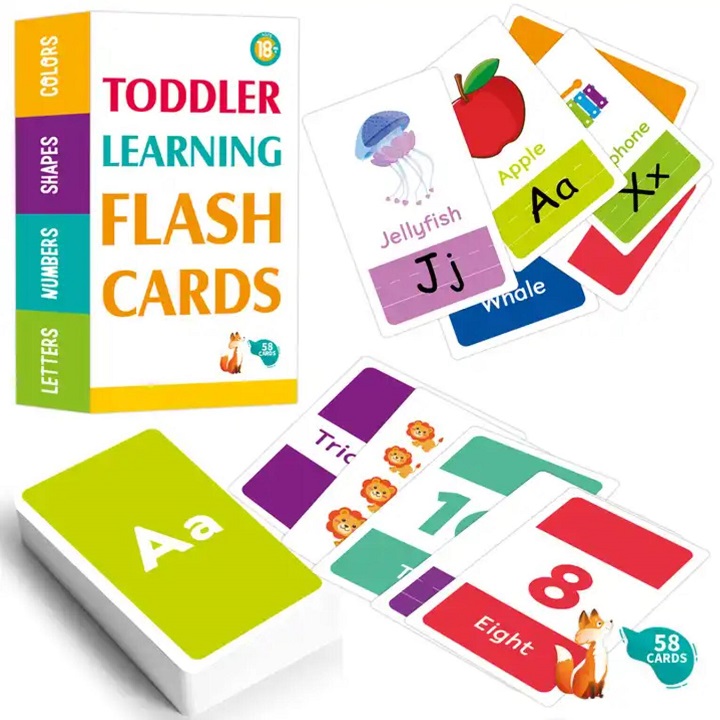Educational cards have long been recognized as valuable tools for facilitating learning and development in children and adults alike. Whether used in classrooms, homeschooling environments, or as part of self-directed learning, educational cards offer a versatile and engaging way to reinforce key concepts, improve memory retention, and foster critical thinking skills. In this comprehensive guide, we'll explore what educational cards are, how they aid in learning, and their various applications across different educational settings.
Understanding Educational Cards
Educational cards, also known as flashcards or learning cards, are portable cards featuring information, images, or questions on one side and corresponding answers or additional information on the other. They cover a wide range of subjects and topics, including language arts, mathematics, science, history, geography, and more. Educational cards come in various formats, including traditional printed cards, digital flashcards, and interactive apps, catering to different learning preferences and technological advancements.
Features of Educational Cards
Content Variety: Educational cards cover a diverse range of subjects and topics, catering to different age groups, learning levels, and educational goals. From basic alphabet and number recognition to advanced vocabulary and problem-solving skills, there are educational cards available for virtually every learning need.
Interactive Format: Educational cards offer an interactive learning experience, allowing learners to actively engage with the material through reading, writing, listening, and speaking activities. This hands-on approach promotes active participation and deeper understanding of the concepts being taught.
Portability: One of the key advantages of educational cards is their portability, making them convenient for use anytime, anywhere. Whether used during travel, downtime, or as part of a structured learning routine, educational cards provide a compact and accessible way to reinforce learning on the go.
Customizability: Many educational cards are customizable, allowing educators and learners to tailor the content to their specific needs and preferences. This flexibility enables the creation of personalized learning experiences that cater to individual learning styles, interests, and abilities.
How Educational Cards Aid in Learning
Repetition and Reinforcement: Educational cards facilitate repetitive exposure to key concepts, helping to reinforce learning and improve memory retention over time. By reviewing the content repeatedly, learners can solidify their understanding and recall the information more effectively.
Active Engagement: Educational cards encourage active engagement with the material, prompting learners to actively participate in reading, reciting, and responding to the content. This active involvement promotes deeper comprehension and critical thinking skills, leading to more meaningful learning outcomes.
Visual and Auditory Learning: Educational cards appeal to both visual and auditory learners, incorporating images, diagrams, and text-based information to cater to different learning preferences. Visual learners benefit from the visual representations and spatial organization of the content, while auditory learners benefit from reading aloud and listening to verbal explanations.

Immediate Feedback: Educational cards provide immediate feedback on learning progress, allowing learners to assess their understanding and identify areas for improvement. Whether through self-assessment or peer review, this feedback loop fosters a sense of accountability and encourages ongoing learning and growth.
Versatility and Flexibility: Educational cards are highly versatile and adaptable to different learning environments and teaching styles. They can be used independently or in group settings, integrated into lesson plans or used as standalone learning activities, making them suitable for a wide range of educational settings and contexts.
Applications of Educational Cards
Classroom Learning: Educational cards are commonly used in classrooms as supplemental teaching tools to reinforce classroom instruction, review key concepts, and assess student understanding. They can be incorporated into lesson plans, used for group activities or individual study, and adapted to different subjects and grade levels.
Homeschooling: Educational cards are popular among homeschooling families as versatile resources for teaching and learning across various subjects and grade levels. They provide a structured yet flexible way to cover curriculum objectives, track progress, and customize learning experiences to meet the needs of individual learners.
Test Preparation: Educational cards are effective tools for test preparation, helping learners review and memorize important information, vocabulary, and concepts. Whether preparing for standardized tests, exams, or certifications, educational cards offer a convenient and efficient way to reinforce learning and build confidence.
Language Learning: Educational cards are widely used for language learning and vocabulary acquisition in both formal and informal settings. They help learners practice pronunciation, expand their vocabulary, and improve language proficiency through exposure to words, phrases, and sentences in context.
Professional Development: Educational cards are valuable resources for professional development and lifelong learning, offering concise, targeted information on specific topics, skills, or industry standards. They can be used by professionals to enhance job-related knowledge, stay current with industry trends, and pursue continuing education opportunities.
Conclusion
In conclusion, educational cards are powerful tools for enhancing learning and development across various educational settings and contexts. With their interactive format, content variety, and versatility, educational cards offer a convenient and engaging way to reinforce key concepts, improve memory retention, and foster critical thinking skills. Whether used in classrooms, homeschooling environments, or as part of self-directed learning, educational cards provide learners of all ages with the opportunity to engage actively with the material, promote deeper comprehension, and achieve meaningful learning outcomes. By incorporating educational cards into teaching and learning practices, educators and learners can unlock the full potential of these valuable resources to support lifelong learning and growth.






























